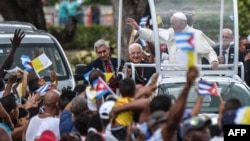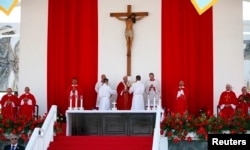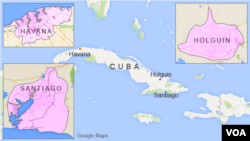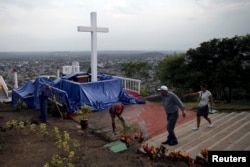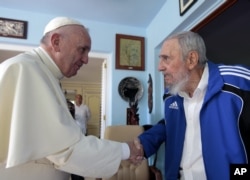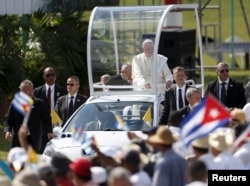Pope Francis landed Monday in Santiago de Cuba, the last stop of his tour of Cuba, where he has been praised for helping to bridge ties between the communist nation and the United States.
The pope visited the shrine of Cuba's patron saint, the Virgin of Charity, before traveling Tuesday to Washington for the U.S. leg of his visit to the two former Cold War enemies.
Pope Francis celebrated Mass earlier Monday in the eastern Cuban city of Holguin, telling tens of thousands of people to heed Jesus Christ's invitation to overcome resistance to change.
During his homily, Pope Francis said Christ challenges the faithful daily to believe in the possibility of personal transformation. "He invites us slowly to overcome our preconceptions and our reluctance to think that others, much less ourselves, can change," he said.
Holguin, Cuba's third-largest city, has been a cradle of the Catholic faith on the island and is known for a cross that has overlooked the town for centuries. It is also the home region of communist leaders Fidel and Raul Castro who have ruled Cuba since 1959.
Pope Francis met with the brothers in Havana at the start of his Cuban trip.
The pope celebrated Mass for tens of thousands gathered in Holguin's Revolution Plaza, urging Cubans to heed Jesus Christ's invitation to overcome resistance to change.
Possibility of change
During his homily, Pope Francis said Christ challenges the faithful daily to believe in the possibility of personal transformation. "He invites us slowly to overcome our preconceptions and our reluctance to think that others, much less ourselves, can change," he said.
Later, the pope will visit La Loma de la Cruz, a cross and lookout point above Holguin, Cuba's third-largest city.
Later Monday, Francis will head to Cuba's second-largest city, Santiago, where he will visit the shrine of the Virgin of Charity, Cuba's patron saint, in the nearby town of Cobre.
Dissidents
Meanwhile, several leading dissidents have criticized the pope for not accepting their requests to meet him during his visit.
The head of the opposition group Ladies in White said 22 of 24 members of her group who wanted to attend Sunday's Mass were prevented from going by Cuban security agents.
And two other well-known Cuban dissidents told The Associated Press that agents detained them after the Vatican invited them to the pope's vespers service at Havana's cathedral.
Marta Beatriz Roque and Miriam Leiva said they received invitations from the office of the papal ambassador in Havana but said they were arrested as they tried to travel to the cathedral.
Vatican spokesman Federico Lombardi said that some dissidents were invited to events to receive a greeting from the pope but that he didn't know why the greeting didn't take place.
Asked if the Holy See would lodge an official protest, Lombardi demurred, saying it was a "passing greeting," not an official meeting.
The dissident Cuban Commission for Human Rights and National Reconciliation estimated 50 dissidents were detained and prevented from attending papal events, with most released within a few hours.
But the Patriotic Union of Cuba (UNPACU), the country’s largest dissident group, said four of its activists remained in jail as of late Sunday. Those four had attempted to deliver a letter to the pope, one of whom got close enough to make contact with Francis in his popemobile, UNPACU leader Jose Daniel Ferrer said.
Sunday Mass
Pope Francis, 78, celebrated Sunday Mass in Havana, preaching before a huge throng of worshippers who packed Havana's historic Revolutionary Square.
Francis urged Cubans to care for one another out of a sense of service, not ideology. "Whoever wishes to be great must serve others, not be served by others. ... Service is never ideological, for we do not serve ideas, we serve people."
It was a subtle jab at the communist system, which even the Vatican spokesman didn't deny. "The pope doesn't tend to make explicitly political speeches, but he has some general principles and everyone is free apply their different experiences of life on them," Lombardi said.
After Mass, the pontiff paid a visit to former Cuban leader Fidel Castro, 89, at his home in Havana.
With Castro's family looking on, the two met in what the Vatican called "a very informal and friendly environment." They also exchanged books on religion as gifts.
Pope Francis later met Fidel's brother and current Cuban President Raul Castro, 84.
The pontiff later held evening prayers with a group of priests and spoke to youths at a cultural center.
Francis and Vatican officials were the force behind months of secret talks between Havana and Washington in 2014.
The talks climaxed with last year's announcements by Raul Castro and U.S. President Barack Obama to reestablish diplomatic ties for the first time in 53 years.
They have since opened embassies in Washington and Havana.
'Fills us with hope'
Francis praised the détente between the two long-estranged neighbors as "an example of reconciliation for the entire world" that "fills us with hope."
This is the third papal visit to Cuba since 1998, when Pope John Paul II came to the island, followed by Pope Benedict in 2012.
Francis wraps up his Cuban visit on Tuesday when the travels from Santiago to the United States.
His U.S. schedule includes a private meeting with Obama, speaking to a joint meeting of Congress, and addressing the U.N. General Assembly in New York.
Pope Francis celebrated an important anniversary Monday: his decision to become a priest.
On Sept. 21, 1953, when Jorge Mario Bergoglio was 17, he went to confession at his parish church in the Flores neighborhood of Buenos Aires. During his confession, he later wrote, he "realized God was waiting for me" and decided to enter the priesthood, The Associated Press reported.
Some material for this report came from AP and Reuters.




